Home Tags Posts tagged with "mali"
mali
Serge Lazarevic, the last French hostage to be held by Islamist militants, has been freed after three years, President Francois Hollande has announced.
Serge Lazarevic was kidnapped in Mali in November 2011 along with fellow Frenchman Philippe Verdon.
Militants from the Al-Qaeda in the Islamic Maghreb (AQIM) group killed Philippe Verdon in 2013 in retaliation for France’s intervention in Mali.
President Francois Hollande said there were no more French hostages waiting to be freed.
Serge Lazarevic, he said, was in “relatively good health” despite the conditions of his captivity and was on his way to the neighboring country of Niger from where he would return to France.
AQIM kidnapped a number of Western hostages before the French military deployed its forces against the group in January 2013.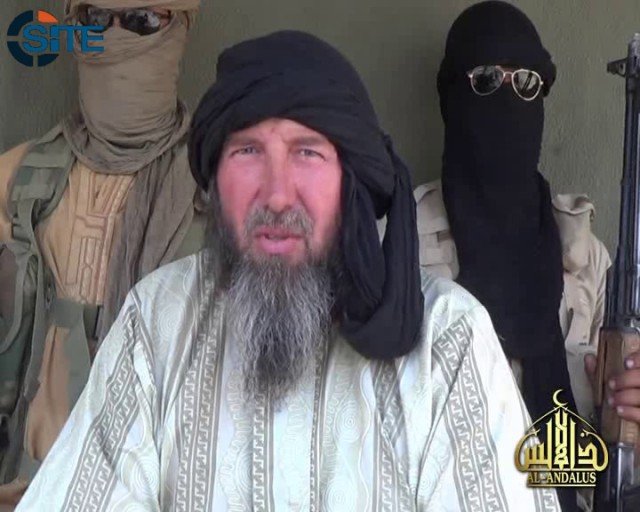
There were at one point at least 14 French nationals being held by Islamists in West Africa.
“There are no more French hostages in any country in the world,” Francois Hollande said.
He thanked the authorities in Niger and Mali, who had “worked towards this happy outcome”.
There have been no details about how the release of Serge Lazarevic was secured.
The French government has repeatedly denied paying ransoms for hostages.
During his captivity, Serge Lazarevic, 50, appeared in several AQIM videos.
There was concern for his father’s health in November after he was filmed pleading for his release.
Serge Lazarevic looked frail in the video and was filmed alongside a second hostage, Dutchman Sjaak Rijke.
It is not clear where the two men were held or whether they were held together.
Sjaak Rijke was kidnapped in November 2011, while visiting the city of Timbuktu as a tourist. There has been no news from him since the video.
[youtube IJ4pPdPHHmw 650]
France’s Foreign Minister Laurent Fabius has revealed that the pilots of Air Algerie plane that crashed in Mali on July 24 had asked to turn back.
Laurent Fabius said the crew of Air Algerie flight AH5017 requested to return to Burkina Faso after initially asking to change course due to bad weather.
The plane’s two flight data recorders have arrived in France.
The jet was flying to Algeria when it crashed in Mali, killing all 118 aboard, including 54 French citizens.
France has taken the leading role in the investigation.
“What we know for sure is that the weather was bad that night, that the plane crew had asked to change route then to turn back before all contact was lost,” Laurent Fabius said on Monday.
A team of French investigators is currently sifting through the plane’s wreckage in Mali, but Laurent Fabius said they were facing “extremely difficult conditions”.
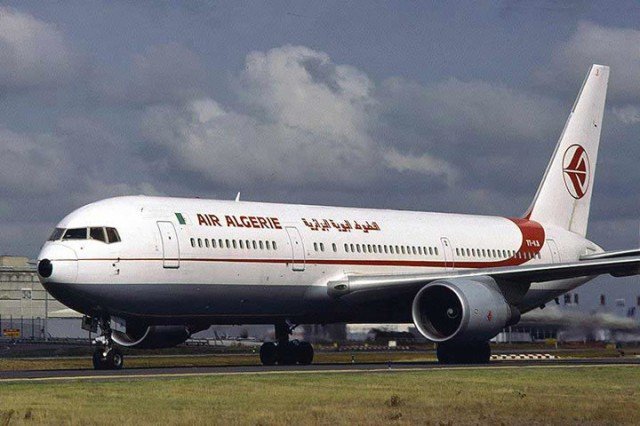
France’s Foreign Minister Laurent Fabius has revealed that the pilots of Air Algerie plane that crashed in Mali on July 24 had asked to turn back
“It’s a long, fastidious and extremely complex job,” he added.
French, Malian and Dutch soldiers from a UN peacekeeping force (MINUSMA) have secured the site, about 50 miles south of the Malian town of Gossi, near the Burkina Faso border.
Earlier on Monday, a French official confirmed that the two flight data recorders had arrived in France and were now being examined by experts.
One of the devices was retrieved almost as soon as rescuers arrived on the spot, while the second was found late Saturday.
A source close to the investigation told the AFP news agency that one of them was badly damaged on the outside.
Martine Del Bono, a spokeswoman for the French aviation investigation office, refused to comment on their condition, telling press: “At this stage, we cannot say anymore.”
Even if both “black boxes” are in good condition, French Transport Minister Thierry Mariani has warned that analyzing the flight data and cockpit conversations could take “weeks”.
French flags were lowered to half-mast on Monday for three days in memory of the dead.
Nearly half of those on board were French. There were also 27 from Burkina Faso and further passengers from, among others, Lebanon, Algeria, Canada and Germany.
Among the French contingent on board flight AH5017 was a family of 10.
The plane, a McDonnell Douglas MD-83, had been chartered from Spanish airline Swiftair and all six members of the crew were Spanish.
Al passengers and crew members on board of Air Algerie flight AH5017 died after the aircraft crashed in Mali, says the French President, Francois Hollande.
Francois Hollande said one flight data recorder had been recovered, after French troops reached the crash site near Mali’s border with Burkina Faso.
Air traffic controllers lost contact with the plane early on Thursday after pilots reported severe storms.
The 116 passengers on the Air Algerie flight included 51 French citizens.
The McDonnell Douglas MD-83 had been chartered from Spanish airline, Swiftair. It was flying from Burkina Faso’s capital, Ougadougou, to Algiers.
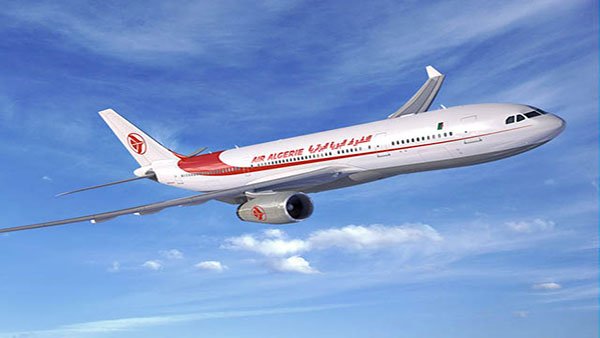
There are no survivors from the Air Algerie AH5017 passenger jet that crashed in Mali
French Interior Minister Bernard Cazeneuve told French radio network RTL that “the aircraft was destroyed at the moment it crashed”.
“We think the aircraft crashed for reasons linked to the weather conditions, although no theory can be excluded at this point,” he said.
A team of 100 French soldiers, with 30 vehicles, had travelled to the crash site on Friday, a French defense ministry official said.
The team was part of a force that was deployed to Mali last year to combat an insurgency backed by al-Qaeda.
“French soldiers who are on the ground have started the first investigations,” Francois Hollande said on Friday.
“Sadly there are no survivors.”
Contact with Flight AH 5017 was lost about 50 minutes after take-off from Ouagadougou early on Thursday morning, Air Algerie said.
The pilot had contacted Niger’s control tower in Niamey at around 01:30 GMT to change course because of a sandstorm, officials say.
Burkina Faso authorities said the passenger list comprised 27 people from Burkina Faso, 51 French, eight Lebanese, six Algerians, two from Luxembourg, five Canadians, four Germans, one Cameroonian, one Belgian, one Egyptian, one Ukrainian, one Swiss, one Nigerian and one Malian.
The six crew members are Spanish, according to the Spanish pilots’ union.
[youtube iz0gn03OZhw 650]
The wreck of Air Algerie plane that disappeared with 116 people on board on a flight from Burkina Faso to Algiers has been found in Mali, officials say.
The Burkina Faso army said Air Algerie flight AH 5017 had crashed about 30 miles from the Burkinabe border.
The wreckage has been found south of the Malian town of Gao.
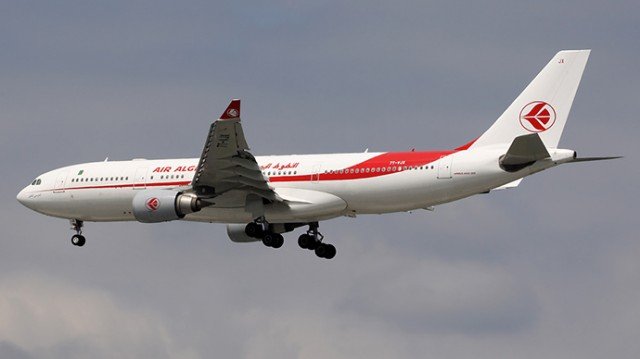
Air Algerie flight AH 5017 had crashed about 30 miles from the Burkinabe border
The searchers mission is complicated by the vast scale and daunting terrain of Mali. The area where the flight is suspected to have crashed is a sparsely inhabited region of scrubland and desert dunes stretching to the foothills of the Adrar des Ifoghas mountains. Much of it lies in the hands of Tuareg separatist rebels, who rose up against the government in early 2012, triggering an Islamist revolt that briefly seized control of northern Mali.
The Malian government has only a weak presence in the region and relies on French and U.N. peacekeepers for aircraft and logistical support.
Air traffic controllers lost contact with the plane early on Thursday after pilots reported severe storms.
The passengers included 51 French citizens.
The McDonnell Douglas MD-83 had been chartered from Spanish airline Swiftair.
[youtube 9gOAx_AaKcI 650]
According to the World Health Organization (WHO), “drastic action” is needed to contain the spread of deadly Ebola in West Africa.
Nearly 400 people have died in the Ebola outbreak which started in Guinea and has spread to neighboring Sierra Leone and Liberia.
It is the largest outbreak in terms of cases, deaths and geographical spread.
The WHO said it was “gravely concerned” and there was potential for “further international spread”.

Nearly 400 people have died in the Ebola outbreak which started in Guinea and has spread to neighboring Sierra Leone and Liberia
The Ebola outbreak started four months ago and is continuing to spread.
So far there have been more than 600 cases and around 60% of those infected with the virus have died.
Ebola, a hemorrhagic fever, has no cure and is spread by contact with the fluids of infected people or animals, such as urine, sweat and blood.
Most of the deaths have been centered in the southern Guekedou region of Guinea.
The WHO has sent 150 experts to the region to help prevent the spread of the virus but admits “there has been significant increase in the number of daily reported cases and deaths”.
Dr. Luis Sambo, the WHO’s regional director for Africa, said: “This is no longer a country-specific outbreak, but a sub-regional crisis that requires firm action.
“WHO is gravely concerned of the on-going cross-border transmission into neighboring countries as well as the potential for further international spread.
“There is an urgent need to intensify response efforts…this is the only way that the outbreak will be effectively addressed.”
The charity Medecins Sans Frontieres (MSF) has already warned that the Ebola outbreak is out of control.
Ebola virus disease (EVD):
- Symptoms include high fever, bleeding and central nervous system damage
- Fatality rate can reach 90%
- Incubation period is two to 21 days
- There is no vaccine or cure
- Supportive care such as rehydrating patients who have diarrhea and vomiting can help recovery
- Fruit bats are considered to be the natural host of the virus [youtube 2l9ung-07qU 650]
Mali’s Tuareg rebels have agreed to a ceasefire, two days after clashes with the army threatened to throw the country back into chaos.
Three Tuareg rebel groups occupying the key northern town of Kidal signed the agreement after talks with African Union chairman Mohamed Ould Abdelaziz.
Some 20 Malian soldiers have died since Wednesday in fighting over who holds the town.
The separatists have gained control of much of northern Mali in recent days.
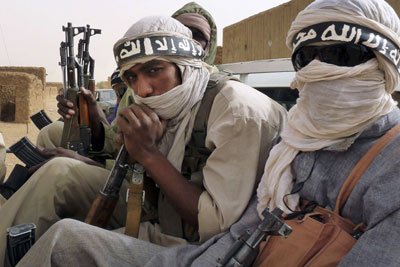
Tuareg rebels have agreed to a ceasefire, two days after clashes with the army threatened to throw Mali back into chaos
In 2012 a Tuareg rebellion in northern Mali triggered a military coup in the capital, Bamako and an Islamist takeover of the north.
Civilian rule was re-established in 2013, but Islamist and separatist forces remain active in some areas.
Mohamed Ould Abdelaziz, the president of Mauritania, flew to Kidal on Friday to meet rebel groups including the National Movement for the Liberation of Azawad (MNLA).
Minister for Internal Security General Sada Samake signed the ceasefire on behalf of the Malian government at 21:30 GMT on Friday.
The ceasefire agreement includes a pledge to revive talks and the release of 300 Tuareg prisoners held in the capital.
Violence broke out in Kidal on Saturday when Malian PM Moussa Mara visited the town to show support for government forces based there.
The rebels seized government buildings, killed at least eight civilians and took around 30 hostages, who were later released.
The separatists said they defeated government forces the town on Wednesday.
MNLA fighters have also taken control of several other towns in the north, including Menaka, Agelhok, Anefis and Tessalit. They said earlier on Friday that they were close to the key city of Gao.
The government has accused the Tuaregs of being backed by al-Qaeda militants, and called for an immediate ceasefire.
[youtube dpznm_QQFKY 650]
The number of deaths from the Ebola virus in Guinea has passed 100, the UN World Health Organization (WHO) says.
It was “one of the most challenging Ebola outbreaks we have ever dealt with” and could take another four months to contain, the WHO said.
The Ebola virus had now killed 101 people in Guinea and 10 in Liberia, it said.
Ebola is spread by close contact and kills between 25% and 90% of its victims.
Many West African states have porous borders, and people travel frequently between countries.
Southern Guinea is at the epicenter of the outbreak, with the first case reported last month.
The geographical spread of the outbreak is continuing to make it particularly challenging to contain – past outbreaks have involved much smaller areas.
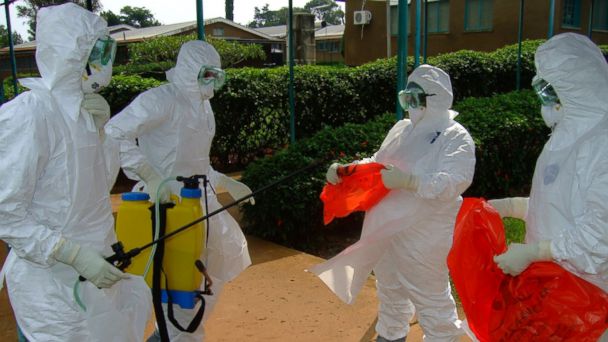
The number of deaths from the Ebola virus in Guinea has passed 100 (photo Getty Images)
“We fully expect to be engaged in this outbreak for the next two to three to four months before we are comfortable that we are through it,” Keija Fukuda, WHO’s assistant director-general, said at a news briefing in Geneva, Reuters news agency reports.
The WHO said 157 suspected cases had been recorded in Guinea, including 20 in the capital, Conakry.
Sixty-seven of the cases have been confirmed as Ebola, it added.
In neighboring Liberia, 21 cases had been reported, with five confirmed as Ebola, the WHO said.
Mali had reported 9 suspected cases, but medical tests done so far showed that two of them did not have Ebola, it said.
Last week, Mali said it was on high alert because of fears of an outbreak of the tropical virus and it would tighten border controls.
Saudi Arabia has suspended visas for Muslim pilgrims from Guinea and Liberia, in a sign of the growing unease about the outbreak.
This is the first known outbreak in Guinea – most recent cases have been thousands of miles away in the Democratic Republic of Congo and Uganda.
There is no known cure or vaccine for Ebola.
Ebola leads to haemorrhagic fever, causing muscle pain, weakness, vomiting, diarrhoea and, in severe cases, organ failure and unstoppable bleeding.
[youtube P0V87ocADzI 650]
Mali’s former coup leader General Amadou Sanogo has been charged with “murders and assassinations”, the justice ministry has said.
Armed troops went to Amadou Sanogo’s home to take him before a judge, after which he was remanded in custody.
Amadou Sanogo had repeatedly been called in for questioning over the deaths of six soldiers during an army protest in September but failed to appear.
The March 2012 coup plunged Mali into chaos, allowing Islamist militants to take over territory in the north.
The al-Qaeda-linked insurgents were ousted from the major towns in the north with the help of France and West African troops earlier this year.
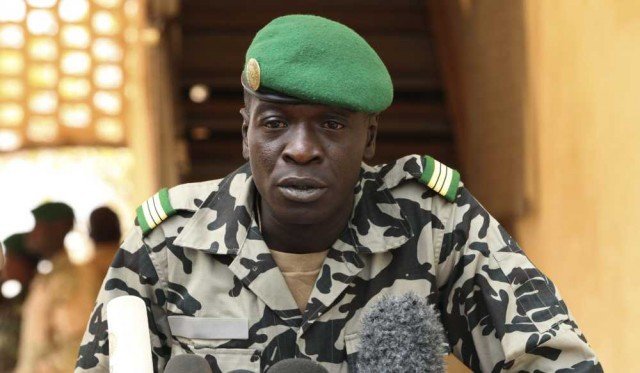
Amadou Sanogo was taken away in handcuffs from his home by about 25 armed soldiers for questioning
Amadou Sanogo, who was a middle-ranking officer when he led the coup, was taken away in handcuffs from his home by about 25 armed soldiers for questioning.
The justice ministry confirmed he had been charged with “murder and assassination and complicity in murder and assassination”.
The former junta leader was also charged with kidnapping, a judicial source told the AFP news agency.
Gen. Amadou Sanogo toppled President Amadou Amani Toure, accusing him of not doing enough to combat a Tuareg-led rebellion in the north.
As well as prompting the Islamist insurgency, the coup also caused a rift between pro-junta soldiers, known as green berets, and those loyal to the former president, known as red berets.
A collective of wives, widows and parents of 23 Malian red beret soldiers who disappeared in the month following the 2012 coup welcomed the news of General Amadou Sanogo ‘s detention.
[youtube Aq7AJCdVjNE 650]
RFI journalists Claude Verlon and Ghislaine Dupont have been killed after they were kidnapped in the northern town of Kidal in Mali.
Claude Verlon and Ghislaine Dupont were abducted after interviewing a local political leader. Their bodies were found outside the town soon after.
French President Francois Hollande called the killings “despicable”.
The killings come days after France was celebrating the release of four hostages from neighboring Niger.
Radio France Internationale (RFI) said Claude Verlon and Ghislaine Dupont were on their second assignment in Kidal, having travelled to the town in July to cover the first round of the presidential election.

RFI journalists Claude Verlon and Ghislaine Dupont have been killed after they were kidnapped in the northern town of Kidal in Mali
Ambeiry Ag Rhissa, a local official of the MNLA ethnic Tuareg separatist group, said Claude Verlon and Ghislaine Dupont had just finished interviewing him when they were kidnapped outside his house.
“When they left, I heard a strange noise outside,” he told Reuters news agency by telephone.
“I immediately went out to see and when I opened my door, a turbaned man pointed a gun at me and told me go back inside.”
Sources said four men forced the journalists into a beige truck which was then driven off into the surrounding desert.
One report said the kidnappers’ vehicle was being pursued by the security forces, possibly including the French army. A French attack helicopter was seen above Kidal a few hours after the abduction occurred.
The bodies of the two journalists were found some 8 miles outside Kidal, sources said.
Confirming their deaths, the French foreign ministry said it would “in conjunction with the Malian authorities, make every effort to find out as soon as possible about the circumstances of their death”.
A statement from President Francois Hollande’s office said he “expresses his indignation over this despicable act”, adding that he is meeting ministers on Sunday to discuss the incident.
Claude Verlon and Ghislaine Dupont’s deaths bring to 42 the number of journalists around the world killed so far in 2013.
Two French journalists have been kidnapped in the northern Mali town of Kidal.
The governor of the region, Colonel Adama Kamissoko, told Reuters news agency “they were abducted by four armed men”. He said the pair left the capital Bamako for Kidal on Tuesday.
Radio France Internationale (RFI) confirmed on its website that two of its journalists had been kidnapped.
They have been named in French media as Claude Verlon and Ghislaine Dupont.
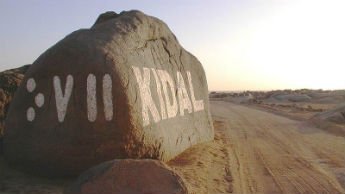
Two French journalists have been kidnapped in the northern Mali town of Kidal
The French foreign ministry says it is checking the reports.
The journalists had been interviewing Kidal resident Ambeiry Ag Rhissa, a local official of the MNLA ethnic Tuareg separatist group, Reuters reports.
“When they left, I heard a strange noise outside. I immediately went out to see and when I opened my door, a turbaned man pointed a gun at me and told me go back inside,” he told Reuters by telephone.
“I could not see how many men were there,” he said.
France led an operation to oust Islamist rebels from northern Mali – its former colony – earlier this year, sending in thousands of troops.
It handed over responsibility for security to a UN force in the summer, however French troops are still in the country helping to prevent a resurgence of militant activity in the region.
Ibrahim Boubacar Keita has won Mali’s presidential election after his rival Soumaila Cisse admitted defeat in the second round.
Ex-Finance Minister Soumaila Cisse said he had congratulated Ibrahim Boubacar Keita and wished him good luck, AFP reported.
Ibrahim Boubacar Keita, 68, served as prime minister from 1994 to 2000.
Mali has suffered a year of unrest including a military coup and a French-led military intervention to oust Islamist rebels from the north.
No official results have yet been released following Sunday’s runoff, however, reports had put Ibrahim Boubacar Keita well ahead.
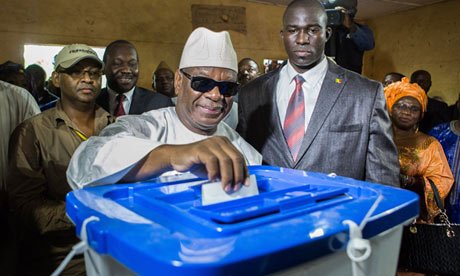
Ibrahim Boubacar Keita has won Mali’s presidential election after his rival Soumaila Cisse admitted defeat in the second round
In the first round Soumaila Cisse polled just 19% against Ibrahim Boubacar Keita’s 40% and most of the other candidates then gave Keita their endorsements.
Ibrahim Boubacar Keita – known as IBK – will now oversee more than $4 billion in foreign aid promised to rebuild the West African state.
A 12,600-strong United Nations Stabilisation Mission in Mali (Minusma) is currently deploying, as France begins to withdraw its 3,000 troops.
After the first round Soumaila Cisse had complained of widespread fraud, with more than 400,000 ballots declared spoiled.
However, Mali’s Constitutional Court rejected the allegations and the head of the EU election observer mission, Louis Michel, praised the electoral process for its transparency.
On Monday, observers from the EU and the African Union again praised the way the second round was carried out.
“Malians should be congratulated because it seems to me they are regaining control of their democratic destiny, which is in fact nevertheless a tradition that exists in Mali,” said Louis Michel.
[youtube Cr9W4zSeu2s]
Mali is set to begin voting in a presidential election run-off.
Many expect Former PM Ibrahim Boubacar Keita, who won 40% of the vote in the first round, to defeat ex-Finance Minister Soumaila Cisse.
The election follows more than a year of turmoil which included a coup and a French-led military intervention to oust Islamist rebels from the north.
The victor will oversee more than $4 billion in foreign aid promised to rebuild the West African state.
A 12,600-strong United Nations Stabilisation Mission in Mali (Minusma) is currently deploying, as France begins to withdraw its 3,000 troops.
The UN has stressed the importance of the election to the restoration of constitutional order and the start of national dialogue and reconciliation.
A record 49% of the 6.8 million registered voters cast a ballot in first round on 28 July.
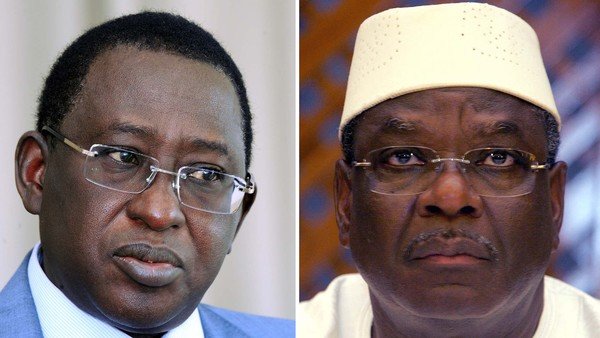
Mali presidential candidates Soumaila Cissé and Ibrahim Boubacar Keita
Soumaila Cisse, who was second among the 27 candidates with 19.7% of the vote, complained that there was widespread fraud, with more than 400,000 ballots declared spoiled.
However, Mali’s Constitutional Court rejected the allegations and the head of the EU election observer mission, Louis Michel, praised the electoral process for its transparency.
Ahead of Sunday’s second round, for which some 21,000 polling stations are due to open across Mali at 08:00 GMT, Louis Michel said he had been “positively surprised” by preparations.
Ibrahim Boubacar Keita – who is popularly known by his initials, “IBK” – has urged voters to give him what he called a “clear and clean” majority in the run-off.
“My first priority would be the reconciliation of the country. After the trauma that it has suffered, a new start is needed,” he told reporters on Saturday.
But IBK also said he would be pursuing “a real peace… not a false one”.
Ibrahim Boubacar Keita, 68, has the support of influential moderate Islamic leaders, and 22 of the 25 losing first-round candidates have given him their backing.
Soumaila Cisse, 63, has run on pledges to improve education, create jobs and reform the army. He has been more openly critical of the leaders of last year’s military coup than Ibrahim Boubacar Keita.
“I am confident, because it is not about adding to the votes from the first round, there will be new votes, it is a new election,” he told the AFP news agency on Saturday.
“Everything restarts from zero.”
[youtube avyoRXNJDZI]
Polls open across Mali for a presidential election aimed at reuniting the country after months of political turmoil.
Security is tight, with many areas still recovering after a northern rebellion and coup that resulted in foreign military intervention.
There are 27 candidates and if no outright winner emerges, the voting goes to a second round on August 11.
However, some analysts have questioned whether Mali is ready for the election.
Hundreds of thousands of people in the north were displaced by fighting. The majority of them will not be able to vote.
Islamist militants in the north have also warned Muslims not to take part and have threatened to attack polling stations.
There are also concerns about the fairness of the electoral process in the northern town of Kidal, which is still occupied by Tuareg rebels.
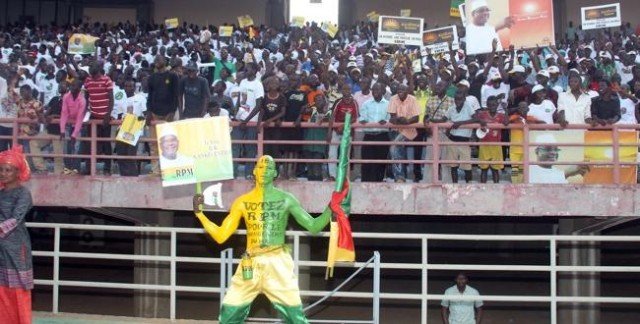
Polls open across Mali for a presidential election aimed at reuniting the country after months of political turmoil
Tuareg gunmen were suspected of abducting electoral officials in the northern Tessalit area last week as they handed out voter identification cards. The officials were later released.
French troops are still deployed in the area with Chadian forces as part of the UN stabilization force, Minusma.
Despite the problems, Louis Michel, head of the EU’s election observer mission, said he was “positively surprised” by preparations for the vote and that the conditions were acceptable.
The US ambassador to Bamako, Mary Beth Leonard, said the fragility of Mali’s interim government had to end.
“A month ago, there were a lot of doubts [over the election]. But it has come together,” Mary Beth Leonard said.
Candidates include three former prime ministers, a former finance minister and one woman.
The frontrunners include Ibrahim Boubacar Keita, prime minister from 1994 to 2000, who founded his own party, the Rally for Mali (RPM), in 2001.
At his final rally in the capital Bamako on Friday, Ibrahim Boubacar Keita – known as IBK – appealed for a calm election day and vowed to ensure that “no-one will make fun of Mali again”.
IBK’s biggest rival is seen as Soumaila Cisse, who founded his own party, the Union for the Republic and Democracy (URD), in 2003.
Soumaila Cisse has called for the junta that seized power in 2012 to be cleared from the political scene.
Observers say Soumana Sacko, another former prime minister, can expect a good showing if there is no clear winner.
[youtube S4Au7qTHPPM]
France has confirmed today that Islamist commander Abdelhamid Abou Zeid has been killed in fighting in Mali.
Abdelhamid Abou Zeid was a senior figure in al-Qaeda in the Islamic Maghreb (AQIM).
Earlier, the French newspaper Le Monde said DNA samples had made it possible to formally identify Abdelhamid Abou Zeid.
The Chadian army fighting alongside French forces claimed earlier this month it had killed Abou Zeid and fellow militant Mokhtar Belmokhtar in fighting in February.
“The president of the French Republic confirms with certainty the death of Abdelhamid Abou Zeid after an offensive by the French army in the Adrar des Ifoghas (mountains) in the North of Mali, at the end of February,” the Elysee presidential palace said.
The statement said the death of “one of the main leaders of AQIM marks an important stage in the fight against terrorism in the Sahel (region)”.
The fate of Mokhtar Belmokhtar has yet to be confirmed.

France has confirmed today that Islamist commander Abdelhamid Abou Zeid has been killed in fighting in Mali
Islamist rebels seized the vast north of Mali a year ago after a military coup in the capital Bamako. They imposed strict Sharia law on the people they controlled.
France intervened militarily in January amid fears that the militants were preparing to advance on Bamako.
France currently has about 4,000 troops in Mali.
Mali’s army and troops from several African countries, including 2,000 from Chad, have also been involved in the fighting.
Since the intervention began, major cities including Gao, Kidal and Timbuktu have been recaptured but fighting is still continuing in desert mountains.
France plans to withdraw its troops from Mali next month, with West African countries expected to take over in the run-up to elections due in July.
Abdelhamid Abou Zeid was believed to be behind several kidnappings of Westerners.
On Wednesday, AQIM said it had killed French hostage Philippe Verdon who was taken prisoner in Mali in 2011.
It said his death – which France has not yet confirmed – was in retaliation for France’s intervention in Mali.
As well as Philippe Verdon, a total of 14 French nationals are still being held by Islamist groups in Africa.
A heavy gunfire is being exchanged between Malian troops and suspected Islamist militants on the streets of Gao in northern Mali.
The clashes began near the central police station but have since spread.
It comes a day after a suicide bomber blew himself up near a checkpoint at a northern entrance to the town – the second such attack in two days.
Gao was retaken just over two weeks ago by French and Malian forces, who supposedly drove out the Islamists.
Security had been tightened in the wake of the suicide attacks, with military patrols stepped up and checkpoints put in place.
The Movement for Oneness and Jihad in West Africa (Mujao) said it had carried out Sunday’s attack on Malian troops as well as both the suicide bombings, AFP news agency reports.

A heavy gunfire is being exchanged between Malian troops and suspected Islamist militants on the streets of Gao in northern Mali
On Saturday, Mujao spokesman Abou Walid Sahraoui said: “We are dedicating ourselves to carrying out more attacks against France and its allies.”
Sunday’s gun battle appears to have started around the main police station in the town centre, but there is now heavy gunfire coming from different areas.
A Malian soldier holding one army position told him that some gunmen were driving around on motorbikes.
People are barricaded inside their houses and the situation remains unclear.
However, worries that Islamist militants had infiltrated Gao seems to have become reality, as they are waging a guerrilla war in the town.
There was no immediate comment from the Malian and French militaries.
[youtube r5krmG-QdFg]
French-led troops have entered Kidal in the north of Mali, the last major town they have yet to secure in their drive against Islamist militants.
French forces now control Kidal airport after a number of aircraft, including helicopters, landed there overnight.
Islamist militants were reported to have already left the town and it was unclear who was in charge.
French and Malian forces have been sweeping north, earlier taking Gao and Timbuktu with almost no resistance.
France – the former colonial power in Mali – launched a military operation this month after Islamist militants appeared to be threatening the south.
French army spokesman Colonel Thierry Burkhard confirmed that: “French elements were deployed overnight in Kidal.”
One regional security source told Agence France-Presse that French aircraft had landed at Kidal and that “protection helicopters are in the sky”.
Kidal, 1,500 km (930 miles) north-east of the capital Bamako, was until recently under the control of the Ansar Dine Islamist group.
However, the Islamic Movement of Azawad (IMA), which recently split from Ansar Dine, said it was now in charge in Kidal, although the Tuareg group – the National Movement for the Liberation of Azawad – also claims control.
An MNLA spokesman said its fighters had entered the city on Saturday and there were no Islamist militants there.
Some reports say Ansar Dine leader Iyad Ag Ghaly and Abou Zeid, of al-Qaeda in the Islamic Maghreb, have moved to the mountainous region north of Kidal.
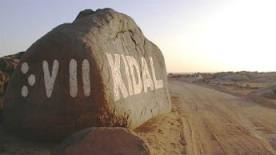
French-led troops have entered Kidal in the north of Mali, the last major town they have yet to secure in their drive against Islamist militants
A spokesman for the IMA confirmed the French arrival in the town and said that its leader was now in talks with them.
The IMA recently said it rejected “extremism and terrorism” and wanted a peaceful solution.
The MNLA has also said it is prepared to work with the French “to eradicate terrorist groups” in the north but that it would not allow the return of the Malian army, which it accused of “crimes against the civilian population”.
Taking Kidal will mark the end of the first phase of the French military intervention, but that there will remain the difficult task of chasing the fighters down across the vast desert.
Islamist extremists took advantage of a military coup in March last year to control a number of cities in the north and impose Sharia law.
The French arrival at Kidal came only 24 hours after securing Timbuktu with Malian forces.
The troops had to secure the streets after hundreds of people looted shops they said had belonged to militant sympathizers.
France has been pushing for the swift deployment of an African Union-backed force, the International Support Mission to Mali (Afisma), to take control of Malian towns.
On Tuesday, international donors meeting in Ethiopia pledged $455.53 million for Afisma and for other projects.
African leaders say the overall budget could be around $950 million.
France’s Foreign Minister Laurent Fabius told the meeting impressive progress had been made but that this did not mean the danger was over.
Laurent Fabius also said credible elections in Mali would be vital to achieving sustainable peace in the country.
Mali’s interim President Dioncounda Traore said on Tuesday that he wanted to hold “transparent and credible” elections by July 31.
France’s President Francois Hollande says more French troops are to be deployed in Mali to support the 750 in the country countering an Islamist insurgency.
Francois Hollande said new air strikes overnight had “achieved their goal”. One target was the town of Diabaly, which rebels entered on Monday.
West African military chiefs will meet in Mali on Tuesday to discuss how an alliance with the French will work.
France began its intervention on Friday to halt the Islamists’ advance south.
Late on Monday, the UN Security Council unanimously backed the intervention.
Francois Hollande, on a visit to the French regional military base known as Peace Camp in Abu Dhabi, said: “For now, we have 750 men and the number will increase. New strikes overnight achieved their goal.”
He said that assembling an African military force to work with the French troops could take a “good week”.
Francois Hollande told RFI radio: “We are confident about the speed with which we will be able to stop the aggressors, the enemy, these terrorists.”
The French contingent is expected to rise to 2,500 in the coming weeks.
Witnesses in Diabaly, 400 km (250 miles) north-east of Mali’s capital, Bamako, said there had been heavy air strikes overnight to try to dislodge Islamists who had taken the town from Malian forces on Monday.

President Francois Hollande says more French troops are to be deployed in Mali to support the 750 in the country countering an Islamist insurgency
However, Francois Hollande said the Islamists had not captured it, but were merely hiding there “to protect themselves”, adding: “They will be chased out.”
One visitor, Ibrahim Toure, told Associated Press: “They bombed the town all night long. I am hiding inside a house. It only stopped at around 06:00.”
One Malian security source told Agence France-Presse news agency that “at least five Islamists were killed and many injured”.
Some 30 French tanks and armored troop transport vehicles also crossed into Mali from Ivory Coast on Monday, with a helicopter escort, witnesses said.
Nigeria is set to lead the regional force, supplying 600 troops. Benin, Burkina Faso, Ghana, Niger, Senegal and Togo have also pledged soldiers. Britain has deployed troop plane transporters.
The African force will be deployed under UN Security Council resolution 2085, which was passed in December and allows for a 3,000-strong mission.
French Foreign Minister Laurent Fabius says there will be a donor meeting towards the end of January to discuss the funding of the anti-Islamist intervention.
He also denied the French intervention would boost al-Qaeda recruitment.
“It’s not encouraging terrorism to combat terrorism,” he said.
French war planes have carried out a series of air strikes since the intervention began on Friday.
Islamists are reported to have withdrawn from the major towns of Timbuktu and Gao.
One spokesman for the Ansar Dine militant group, Senda Ould Boumama, said the withdrawal was a “tactical retreat” to reduce civilian casualties.
One resident of Timbuktu told AFP: “The mujahideen have left. They are really scared.”
However, one spokesman for the Islamist group, the Movement for Oneness and Jihad in West Africa, told AP: “I would advise France not to sing their victory song too quickly. They managed to leave Afghanistan. They will never leave Mali.”
On Monday, the UN Security Council convened in New York for an emergency meeting at France’s request.
France’s UN ambassador Gerard Araud said his country had the “understanding and support” of the 14 other Security Council members.
A meeting of EU foreign ministers in Brussels on Thursday will discuss EU involvement.
At least 11 Malian soldiers and a French helicopter pilot have died in Mali since Friday’s intervention. More than 100 militants are reported to have been killed.
Islamist groups and secular Tuareg rebels took advantage of chaos following a military coup to seize northern Mali in April 2012.
But the Islamists soon took control of the region’s major towns, sidelining the Tuaregs.
[youtube LCjn9KD_cPY]
Cheick Modibo Diarra, Mali’s prime minister, has resigned on state television, hours after being arrested by soldiers who were behind a military coup in March.
Cheick Modibo Diarra was detained on Monday at his home in the capital Bamako, reportedly on the orders of the coup leader, Capt Amadou Sanogo.
He had been due to travel to France.
Cheick Modibo Diarra, 60, was made prime minister of an interim government in April after the military officially handed power back to civilians.
The astrophysicist has backed plans to send a West African intervention force into the northern half of Mali which was seized after the coup by Islamists and Tuareg separatists.
But tensions between the soldiers who led the coup and the civilian prime minister they were forced to appoint have been mounting in recent weeks.
Many within Mali’s military are opposed to foreign intervention, saying they need only financial and logistical support.
Military spokesman Bakary Mariko said that the prime minister was suspected of attempting to jeopardize the planned political dialogue over the transition to democracy.
“Eight months ago the prime minister was given the mission to help Mali recover its territorial integrity, but unfortunately he has been working to stay in power indefinitely,” he said.
Cheick Modibo Diarra would be held until a new prime minister was appointed by the interim president, the spokesman said.
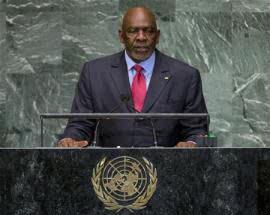
Cheick Modibo Diarra, Mali’s prime minister, has resigned on state television, hours after being arrested by soldiers who were behind a military coup in March
In his address on national broadcaster ORTM, Cheick Modibo Diarra gave no clear explanation of his resignation.
“Men and women who are worried about the future of our nation, you are hoping for peace. It’s for this reason that I, Cheick Modibo Diarra, am resigning along with my entire government.”
A member of the president’s entourage earlier told AFP news agency that the prime minister had been arrested by about 20 soldiers from the sprawling Kati military base where the 21 March coup was launched.
The source said soldiers had: “smashed in the door of the prime minister’s residence and took him away a bit violently”.
“They said Captain Sanogo sent them to arrest him,” he added.
Security officials said Cheick Modibo Diarra was then driven to Kati.
The military spokesman told Reuters that Cheick Modibo Diarra “wanted to leave the country having incited trouble”.
The prime minister had been about to leave the country for France – the spokesman said. It is not known if he had been trying flee.
Cheick Modibo Diarra, the son-in-law of Moussa Traore, a former Malian coup leader and president, had been leading a government of national unity.
It was formed in August in an attempt to satisfy regional demands for a transition from military rule and to restore stability following the March coup, which led to the entire northern half of the country being occupied by hardline Islamists and Tuareg rebels.
The Islamists have since taken control of northern Mali’s main urban centres, imposing a strict version of Islamic law.
The United Nations warned on Monday that the north of the country is now “one of the potentially most explosive corners of the world”.
The West African regional group Ecowas has agreed to send 3.300 troops to reclaim rebel-held territory. The deployment has been backed by UN Secretary General Ban Ki-moon.
On Monday, the European Union backed plans for a 250-member training mission for around four battalions of the Malian army to fight the militants.
[youtube 5khp4ASf8LY]
[youtube j0rqmSZIohk]


















